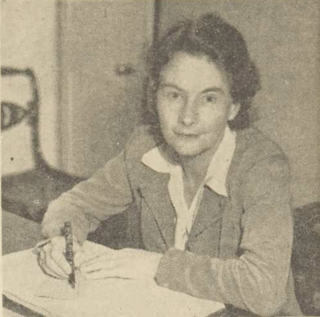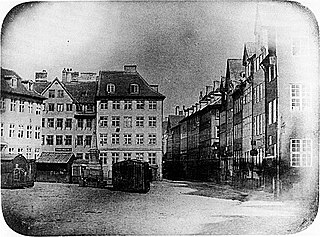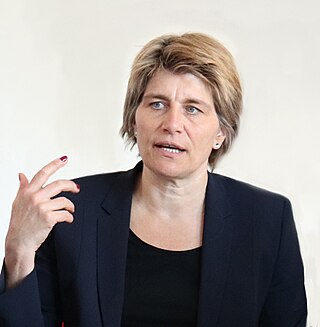Related Research Articles

Margaret Mead was an American cultural anthropologist who featured frequently as an author and speaker in the mass media during the 1960s and the 1970s.
Applied anthropology is the practical application of anthropological theories, methods, and practices to the analysis and solution of practical problems. The term was first put forward by Daniel G. Brinton in his paper titled, "The Aims of Anthropology" and John Van Willengen simply defined applied anthropology as "anthropology put to use" Applied anthropology includes conducting research with a primary or tertiary purpose to solve real-world problems in areas such as public health, education, government, business, and more.

Hortense Powdermaker was an American anthropologist best known for her ethnographic studies of African Americans in rural America and of Hollywood.

Barbara Myerhoff was an American anthropologist, filmmaker, and founder of the Center for Visual Anthropology at the University of Southern California. Throughout her career as an anthropologist, Barbara Myerhoff contributed to major methodological trends which have since become standards of social cultural anthropology. These methods include reflexivity, narrative story telling, and anthropologists' positioning as social activists, commentaries, and critics whose work extends beyond the academy.

Amulya Malladi is an author. She earned her bachelor's degree in electronics engineering from Osmania University, Hyderabad, India and her master's degree in journalism from the University of Memphis, Tennessee, United States.
Dame Ann Marilyn Strathern, DBE, FBA is a British anthropologist, who has worked largely with the Mount Hagen people of Papua New Guinea and dealt with issues in the UK of reproductive technologies. She was William Wyse Professor of Social Anthropology at the University of Cambridge from 1993 to 2008, and Mistress of Girton College, Cambridge from 1998 to 2009.

Phyllis Mary Kaberry was a social anthropologist who dedicated her work to the study of women in various societies. Particularly with her work in both Australia and Africa, she paved the way for a feminist approach in anthropological studies. Her research on the sacred life and significant role of the Aboriginal women of Australia proved to be a controversial topic, as anthropology during her years of early fieldwork was male-dominated, filled with the misconceptions that men were the superior in any aspect of life. Contributing proof of women's significance to societal development and organisation, Kaberry can be defined as an influential and significant anthropologist.

In Denmark, photography has developed from strong participation and interest in the very beginnings of the art in 1839 to the success of a considerable number of Danes in the world of photography today.

Emilie Demant Hatt was a Danish artist, writer, ethnographer, and folklorist. Her area of interest and expertise was the culture and way of life of Sámi people.

Fuambai Sia Ahmadu is a Sierra Leonean-American anthropologist. She has worked for UNICEF and the British Medical Research Council in the Gambia.
"The Matter of Seggri" is a science fiction novelette by American writer Ursula K. Le Guin. It was first published in 1994 in the third issue of Crank!, a science fiction – fantasy anthology, and has since been printed in number of other publications. In 2002, it was published in Le Guin's collection of short stories The Birthday of the World: and Other Stories. "The Matter of Seggri" won the Otherwise Award in 1994 for exploring "gender-bending" and has been nominated for other honors including the Nebula Award.
Mary Margaret Clark (1925–2003) was an American medical anthropologist who is credited with founding the sub-discipline of medical anthropology.
Kirsten Blinkenberg Hastrup is a Danish anthropologist and professor of anthropology at the University of Copenhagen. She has taken a special interest in the conjunction between the history and culture of both Iceland and Greenland, publishing widely on both, while also examining the relationship between the theatre and anthropology. Hastrup was president of the Royal Danish Academy of Sciences and Letters from 2008 to 2016.
Wendy Rosalind James, is a British retired social anthropologist and academic. She was Professor of Social Anthropology at the University of Oxford from 1996 to 2007, and President of the Royal Anthropological Institute from 2001 to 2004.
The Daylight Award is awarded every second year since 2016 "to honor and support daylight research and daylight in architecture, for the benefit of human health, well-being and the environment. The award puts specific emphasis on the interrelation between theory and practice".

Rosan Bosch is the founder and creative director of Rosan Bosch Studio in Copenhagen, Denmark. Internationally known for the design of the Swedish Vittra school at Telefonplan, Bosch has designed learning environments for Sheikh Zayed Private Academy in Abu Dhabi, the IB school Western Academy of Beijing in China and Liceo Europa in Spain.
Rubina Raja is a classical archaeologist educated at University of Copenhagen (Denmark), La Sapienza University (Rome) and University of Oxford (England). She is professor (chair) of classical archaeology at Aarhus University and centre director of the Danish National Research Foundation's Centre of Excellence for Urban Network Evolutions (UrbNet). She specialises in the cultural, social and religious archaeology and history of past societies. Research foci include urban development and network studies, architecture and urban planning, the materiality of religion as well as iconography from the Hellenistic to Early Medieval periods. Her publications include articles, edited volumes and monographs on historiography, ancient portraiture and urban archaeology as well as themes in the intersecting fields between humanities and natural sciences. Rubina Raja received her DPhil degree from the University of Oxford in 2005 with a thesis on urban development and regional identities in the eastern Roman provinces under the supervision of Professors R.R.R. Smith and Margareta Steinby. Thereafter, she held a post-doctoral position at Hamburg University, Germany, before she in 2007 moved to a second post-doctoral position at Aarhus University, Denmark. In 2011–2016, she was a member of the Young Academy of Denmark, where she was elected chairwoman in 2013.

Agnes Winifred Hoernlé née Tucker was a South African anthropologist, widely recognized as the "mother of social anthropology in South Africa". Beyond her scientific work, she is remembered for her social activism and staunch disapproval of Apartheid based on white supremacy. Born in 1885 in the Cape Colony, as an infant she moved with her family to Johannesburg, where she completed her secondary education. After earning an undergraduate degree in 1906 from South African College, she studied abroad at Newnham College, Cambridge, Leipzig University, the University of Bonn, and the Sorbonne. Returning to South Africa in 1912, she undertook anthropological research among the Khoekhoe people, until she married in 1914.
Aino Kann Rasmussen is a Danish archaeologist, curator and former chair of the Velux Foundation.
Else-Marie Boyhus is a Danish food historian. Her research has focused on her country's cooking and food production throughout history. In addition to publishing about the history of food, she has managed several museums and served as the chair of the Danish Museum Board. She is a member of the Danish Gastronomic Academy and co-editor of the academy's gastronomic lexicon.
References
- 1 2 "Bettina Hauge". Light Symposium 2015. Archived from the original on 26 October 2016. Retrieved 7 February 2017.
- 1 2 "Bettina Hauge" (in Danish). Kvinfo. Retrieved 7 February 2017.
- ↑ "Bettina Hauge" (in Danish). Innovationsfonden. Archived from the original on 8 February 2017. Retrieved 7 February 2017.
- ↑ "Bettina Hauge" (in Danish). Altinget. Retrieved 7 February 2017.
- ↑ "Vi tager kunderne med på råd" (in Danish). Schnieder Electric. Retrieved 30 November 2010.
- ↑ "Rituals and care for the family regulate the fresh air in our homes". VELUX. 23 December 2010. Retrieved 8 February 2017.
- ↑ "Bettina Hauge". DTU. Retrieved 8 February 2017.
- ↑ "Hauge, Bettina". WorldCat. Retrieved 8 February 2017.